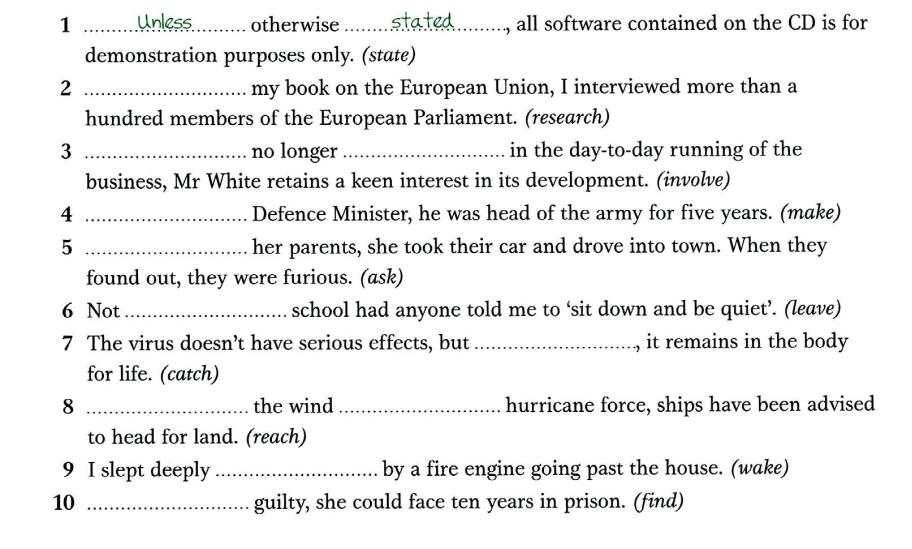
- •Exercises
- •Identify syntactic units in the following cases:
- •Give your own examples of different polycomponent syntactic units (compound, complex, compound-complex).
- •Read the following extracts and identify the types of all the syntactic units
- •Give your own examples of
- •Complete the sentences with one of the words from the box and an appropriate form of the verbs in brackets. Comment on the finite and infinite clauses.
Give your own examples of
polypredicative syntactic units built on interdependence (use different language units possessing valency characteristics)
Coordination:
The storm raged through the night, and the trees bent under the force of the wind.
Here, the predicates "raged" and "bent" are joined by the conjunction "and," making each clause reliant on the other for the complete description of the scene.
Subordination:
She smiled because he told a funny joke.
The main clause "She smiled" is dependent on the subordinate clause "because he told a funny joke" to explain why she smiled.
Subject-Verb Agreement:
The children play in the park, and the birds sing in the trees.
Each verb ("play" and "sing") agrees with its respective subject ("children" and "birds") in number and person.
polypredicative syntactic units built on determination
Relative Clause:
The book that you lent me is fascinating.
The main clause "The book is fascinating" is determined by the relative clause "that you lent me," which specifies which book is being talked about.
Apposition:
My brother, a talented musician, will perform tonight.
The phrase "a talented musician" determines or adds information to "My brother," specifying who will perform tonight.
Determiners:
Several students who missed the exam need to retake it.
The determiner "several" and the relative clause "who missed the exam" determine and specify which students are being referred to.
polypredicative syntactic units built on constellation
Coordination:
The boy ran fast, and the girl jumped high. (The clauses are linked by the conjunction "and" and have equal grammatical rank.)
Apposition:
The president, the leader of the nation, delivered a powerful speech. (The noun phrase "the leader of the nation" is in apposition to the noun phrase "the president" and provides more information about the president.)
polypredicative syntactic units built on parenthesis
Parenthetical Remark:
The concert—postponed due to rain—will be held next week.
The parenthetical remark "postponed due to rain" provides extra information about the concert without disrupting the main clause "The concert will be held next week."
Embedded Clauses:
Her decision, which surprised everyone, was to move to a new city.
The embedded clause "which surprised everyone" adds context to the main clause "Her decision was to move to a new city."
Comma asides:
He finally decided, after much deliberation, to take the job offer.
The aside "after much deliberation" provides additional context about the decision-making process.
Complete the sentences with one of the words from the box and an appropriate form of the verbs in brackets. Comment on the finite and infinite clauses.
![]()

2 – while researching
3 – although, involved
4 – before making him/becoming
5 – without asking
6 – once leaving
7 – once caught
8 – with the wind reaching land
9 – until I was woken up
10 – if found guilty
